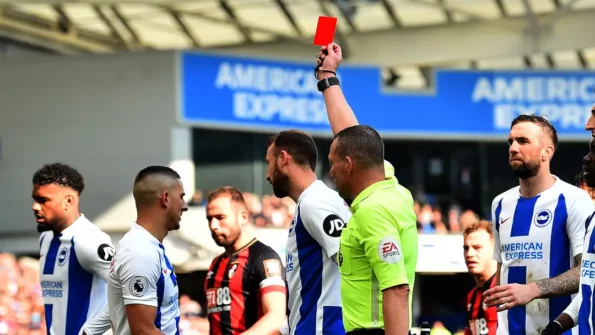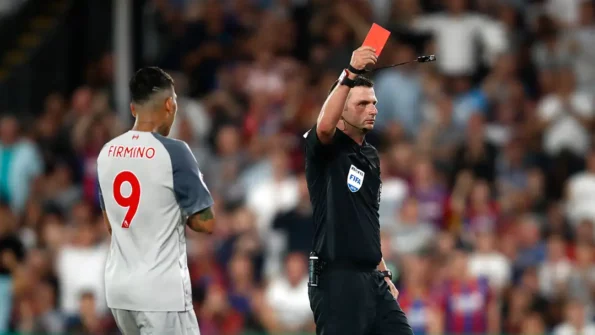Likes any other sport, soccer also has its rules and regulations that players must abide by. A red card in soccer signifies the highest form of punishment a player can receive during a match. In this blog post, we’ll dive deep into the world of soccer and unravel the mystery behind that captivating moment when a player is sent off with a red card.
What is a Red Card?
A red card is a disciplinary action used in soccer to punish players for serious offenses or rule violations. It is considered the most severe punishment that can be given during a match and has significant consequences for both the player and their team.
The concept of a red card was first introduced in 1970 by The International Football Association Board (IFAB), the governing body responsible for determining the rules of soccer. Its purpose was to discourage aggressive and dangerous behavior on the field, ensuring fair play and safety for all players.
Once a red card is shown to a player, they must immediately leave the field of play and cannot be replaced by another teammate. The team must then continue playing with one less player until either half-time if the red card was given in the first half, or the end of the match if given in the second half.

In addition to being ejected from the game, a player who receives a red card may also face further consequences such as a suspension for future matches and fines. The length of suspension and severity of the punishment will depend on the specific rules and regulations of the league or competition.
Common Reasons for Receiving a Red Card
A red card in soccer is a serious disciplinary action that can significantly impact the outcome of a game. It is given by the referee when a player commits a major infraction or misconduct on the field. In this section, we will discuss some of the most common reasons for receiving a red card in soccer.
1. Serious Foul Play
This is perhaps one of the most common reasons for receiving a red card in soccer. Serious foul play refers to any type of physical aggression or reckless challenge that endangers the safety of an opponent. This can include actions such as pushing, kicking, tackling from behind, or using excessive force while challenging for the ball.
2. Violent Conduct
Another reason for receiving a red card is violent conduct. This occurs when a player uses physical force against an opponent without making contact with them. Examples of violent conduct include punching, elbowing, headbutting, or spitting at another player.
3. Denying an Obvious Goal-Scoring Opportunity (DOGSO)
A player may also receive a red card if they deny their opponent an obvious goal-scoring opportunity through illegal means. This includes fouls committed inside the penalty area which result in denying a clear goal-scoring chance for an opposing team’s player.
4. Offensive Language and Gestures
Soccer has strict guidelines regarding discrimination and offensive language used on the field. Any discriminatory behavior based on race, religion, ethnicity, sexual orientation or gender identity can result in a red card being shown to the offending player.
Consequences of Receiving a Red Card
Receiving a red card in a soccer match is a serious offense and can have significant consequences for both the player and their team. In this section, we will discuss the potential consequences of receiving a red card and how it can impact the game.

1. Removal from the Match
The most immediate consequence of receiving a red card is being removed from the game. The player must leave the field immediately and cannot be replaced by another teammate. This means that their team must play with one less player for the remainder of the match, putting them at a disadvantage.
2. Suspension
In addition to being unable to finish the current match, receiving a red card also results in an automatic suspension for future matches. The length of the suspension varies depending on the severity of the offense, but it can range from one game to multiple games or even months in some cases.
3. Fine
Along with suspension, players may also face fines for receiving a red card. These fines are often imposed by governing bodies such as FIFA or UEFA and can be quite substantial. In addition to financial repercussions for the player, this could also put financial strain on their team.
4. Impact on Team Performance
Losing a player due to a red card can greatly affect a team’s performance in not just that particular match but also in future matches if it leads to suspension or injury of key players. One less player on the field means reduced attacking options, increased pressure on defense, and ultimately lower chances of winning.
5. Reputation
Being shown a red card can also have an impact on a player’s reputation. Receiving multiple red cards or committing particularly violent or aggressive offenses can lead to negative perceptions and potentially harm future career prospects.
Strategies for Avoiding a Red Card

Getting a red card can have serious consequences for both the individual player and their team. Not only does it result in immediate ejection from the current game, but also suspension from future games and potentially disciplinary action from the league.
Therefore, it is crucial for players to understand how to avoid getting a red card. Here are some strategies that can help you stay on the field and out of trouble:
1. Know the rules
The first step in avoiding a red card is to know and understand the rules of the game. Familiarize yourself with what constitutes as an offense that could result in a red card, such as violent conduct, dangerous play, or denying an obvious goal-scoring opportunity.
2. Stay calm
Emotions can run high during intense soccer matches, but it’s important to keep your cool on the field. Losing your temper and reacting impulsively can lead to reckless challenges or confrontations with other players, which could result in a red card.
3. Communicate effectively
Good communication with your teammates can prevent misunderstandings and reduce conflicts on the field. Make sure everyone knows their roles and responsibilities so that there is no confusion during gameplay.
4. Be aware of your surroundings
Paying attention to where you are on the field and where other players are around you can help you avoid making accidental or reckless challenges. Be aware of your positioning and try to anticipate the movements of other players.
5. Respect the referee

Referees are there to enforce the rules and ensure fair play. It’s important to show respect towards them, even if you may not agree with their decisions. Arguing or dissent towards the referee can result in a yellow card, which could ultimately lead to a red card if repeated.
Conclusion
A red card in soccer is a severe penalty that can have significant consequences for both the player and their team. As fans, it’s essential to understand the implications of receiving a red card and how it can impact the outcome of a game. And as players, it’s crucial to always play with discipline and avoid behaviors that could result in receiving this disciplinary action on the field.
FAQs
The number of games a player misses due to a red card differs based on the league and the severity of the offense. In most professional leagues, a player is automatically suspended for one game after receiving a red card.
A yellow card in soccer is a warning issued by the referee to a player for a serious foul or misbehavior. If a player receives two yellow cards in a match, they are shown a red card and ejected from the match.
When a player receives a blue card from the referee, it means they are being temporarily suspended from the game for two minutes. This gives them time to reflect on their actions and also serves as a warning.
